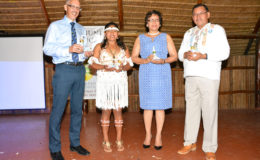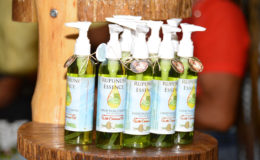The Rupununi Essence Luxury Facial Cleanser, developed by the Makushi Research Unit (MRU), Medicine from Trees and other groups, in collaboration with the Institute of Applied Science and Technology (IAST) was launched on Monday.
A release from the Ministry of the Presidency said that the 100 percent organic skin cleanser was created through a partnership among the Ministry of Social Cohesion, the IAST and indigenous producers from the North Rupununi. The partnership started in November 2015 with the aim of adding value to the products produced by indigenous groups through adding flavours and scents and by refining their production techniques.

“This event is of great significance not only to the Makushi people but to all of our indigenous brothers and sisters because it showcases the novel and innovative mechanisms that can be employed to produce products such as the Rupununi Essence Brand,” Minister of Social Cohesion Amna Ally told the audience at the Sophia Exhibition Centre.
“Our indigenous peoples and their civilisations have contributed greatly to the world’s agricultural diversity and its related biological diversity and knowledge diversity. They are the originators and custodians of millennial and dynamic agriculture and food systems that remain viable in the 21st century,” the Minister said.
The release added that the partnership, along with the Ministry of Indigenous People’s Affairs and women’s and social activist, Vanda Radzik, embarked on a “robust business plan” aimed at empowering, in particular, women producers. The release said that they created a list of sustainable products to develop, such as soaps, body lotions and cleaners made from crabwood oil and other botanicals, which the producers are now exporting. The Parishara peanut butter factory was also refurbished through the collaboration.
Minister of Indigenous People’s Affairs, Sydney Allicock extended congratulations to the MRU and other groups for creating the product.

“You have demonstrated the will to stay close to your culture and heritage. You have therefore helped with the preservation, growth and development of your culture, customs and practices. This is a need…it is the best way to allow, not only man to survive, but also all the other living things within the ecosystem. We hear so much about climate change, but little do we know that when we destroy it is slow suicide to us,” he said, according to the press release.
In his address, IAST Director, Professor Suresh Narine praised Minister Ally, the “tireless” Radzik, Dr. Paloma Mohamed, who was instrumental in crafting the marketing and advertising for the product; Dr. Marie Correia, who taught the group how to make liquid soap and the “indefatigable” Annette Arjoon-Martins.
“For too long we have ignored this amazing patrimony, the gift of knowledge from our indigenous peoples. We like to say that it is “knew” knowledge because they have known this for millennia,” Professor Narine said.
The release said that attendees were treated to musical accompaniment by the Police Steel Orchestra Band and were also entertained by cultural presentations of indigenous song and dance by the Surama and Rupertee culture groups.
Ovid Williams chaired the proceedings and Eugene Xavier, a Wapishana who speaks Makushi, delivered the vote of thanks.





